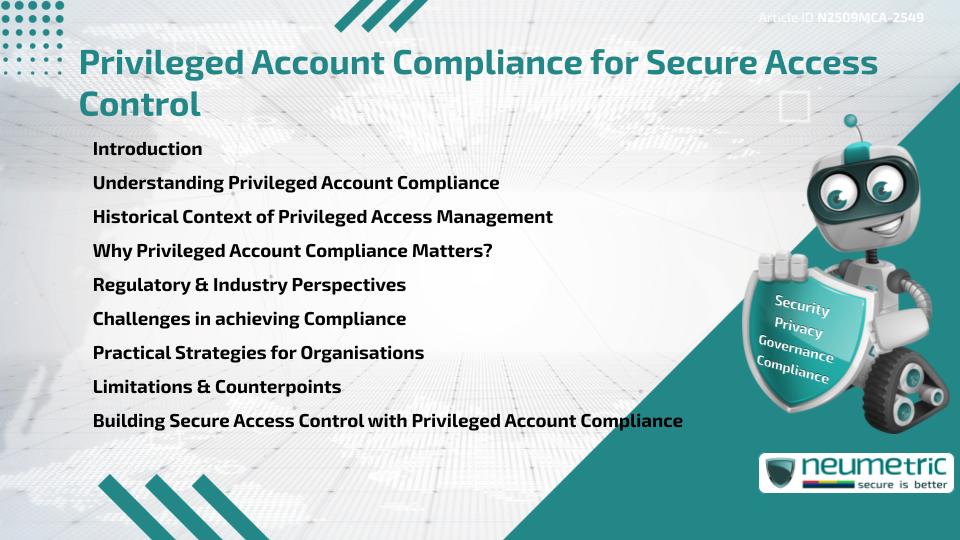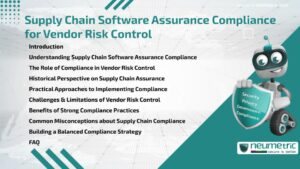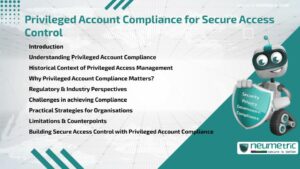Table of Contents
ToggleIntroduction
Privileged Account Compliance is a cornerstone of modern Cybersecurity. Privileged Accounts, such as Administrator or Root accounts, hold elevated Access rights that can configure Systems, access Confidential Data & even bypass Security Controls. Because of their power, they are prime targets for attackers.
Compliance frameworks ensure that Privileged Accounts are governed by clear Policies, Technologies & Processes to prevent misuse & align with Regulatory Standards. Privileged Account Compliance strengthens Secure Access Control, protects Sensitive Information & builds Customer Trust across industries.
Understanding Privileged Account Compliance
Privileged Account Compliance refers to the structured Management & Monitoring of accounts with elevated access. These accounts allow users to make system-wide changes, which means that any compromise can lead to significant damage.
Compliance frameworks require organisations to apply principles such as Least Privilege, meaning users are given only the access necessary to perform their role. Logging, Monitoring & Audit trails are also critical to demonstrate Accountability.
Historical Context of Privileged Access Management
The challenge of managing Privileged Accounts is not new. In the early stages of networked systems, Administrators often relied on shared root or system accounts without strong Authentication Mechanisms. This created gaps in Security Monitoring & Accountability.
As Security Incidents grew, Privileged Access Management [PAM] solutions emerged to provide secure vaulting, session monitoring & rotation of credentials. Today, Privileged Account Compliance is integrated into Industry Standards, ensuring organisations maintain robust oversight.
Why Privileged Account Compliance Matters?
Privileged Account Compliance is essential for several reasons:
- Risk Reduction: Compromised Privileged Accounts can lead to massive Security Breaches.
- Data Protection: Sensitive Customer Information, Financial Information & Patient Records require strict Access Control.
- Regulatory Standards: Frameworks such as ISO 27001 Certification, GDPR Compliance & HIPAA demand secure privileged access management.
- Customer Trust: Clients & Partners expect strong Measures that protect Confidential Data.
Without Compliance, organisations Risk not only fines but also long-term Reputational harm.
Regulatory & Industry Perspectives
Governments & Certification Bodies emphasise Privileged Account Compliance as part of overall Governance Standards.
For instance, the Payment Card Industry Data Security Standard [PCI DSS] requires strict controls around privileged access to payment systems. ISO 27001 Certification outlines Access Controls as a core Security Control. Healthcare regulations, including HIPAA, highlight secure management of Privileged Accounts that access Patient Data.
Industry benchmarks now see Privileged Account Compliance as a fundamental aspect of maintaining Ethical & Regulatory Standards.
Challenges in achieving Compliance
Despite its necessity, Privileged Account Compliance presents challenges:
- Complex Environments: Large organisations often have thousands of Privileged Accounts to track.
- Legacy Systems: Older systems may lack integration with modern PAM solutions.
- Human Error: Misconfigured accounts or poor password practices create Security Gaps.
- Cost: Implementing Privileged Access Management can be resource-intensive.
These challenges require careful planning & phased adoption.
Practical Strategies for Organisations
Organisations can strengthen Privileged Account Compliance through:
- Conducting Risk Assessments to identify & classify Critical Assets.
- Enforcing Least Privilege with strict Access Controls.
- Deploying PAM solutions for credential management & monitoring.
- Applying Continuous Monitoring & Improvement for Accountability.
- Training Employees in Secure Access practices & recognising Risks.
Combining Technical Controls with Employee Training ensures Compliance becomes part of Business Operations rather than an afterthought.
Limitations & Counterpoints
Some experts argue that Compliance frameworks may focus too much on checklists rather than genuine security improvements. Overly rigid implementation can slow Business Operations or frustrate Employees. Additionally, no system is entirely immune to Social Engineering attacks, which can still target privileged users.
However, Evidence consistently shows that organisations with strong Privileged Account Compliance are far better protected against large-scale Security Breaches.
Building Secure Access Control with Privileged Account Compliance
Privileged Account Compliance is more than a Regulatory Requirement-it is a foundation for Secure Access Control. By aligning with Governance Standards, demonstrating Transparency & Accountability & minimising Security Gaps, organisations can protect Confidential Data effectively.
When applied strategically, Privileged Account Compliance strengthens Cybersecurity Strategies, safeguards Customer Trust & ensures Resilience against evolving Threats.
Takeaways
- Privileged Account Compliance is crucial for Secure Access Control.
- Privileged Accounts hold elevated Risks if not properly managed.
- Regulatory Standards demand secure management of Privileged Access.
- Challenges include complexity, cost & human error.
- Practical strategies include Least Privilege, PAM solutions & Employee Training.
FAQ
What is Privileged Account Compliance?
It ensures that accounts with elevated access are managed, monitored & aligned with Regulatory Standards.
Why is Privileged Account Compliance important?
Because Privileged Account s pose high Risks & their misuse can lead to severe Security Breaches.
Which industries need Privileged Account Compliance most?
Finance, Healthcare, Government & Cloud Security providers handling Sensitive Data.
What challenges exist in achieving Privileged Account Compliance?
Large account volumes, legacy systems, human error & the cost of Privileged Access Management solutions.
What frameworks require Privileged Account Compliance?
Standards such as PCI DSS, ISO 27001 Certification, HIPAA & GDPR Compliance.
Does Compliance guarantee complete protection?
No, but it reduces Risks significantly & enhances Secure Access Control.
How can organisations begin Compliance efforts?
By conducting Risk Assessments, applying Least Privilege, deploying PAM solutions & training Employees.
Need help for Security, Privacy, Governance & VAPT?
Neumetric provides organisations the necessary help to achieve their Cybersecurity, Compliance, Governance, Privacy, Certifications & Pentesting needs.
Organisations & Businesses, specifically those which provide SaaS & AI Solutions in the Fintech, BFSI & other regulated sectors, usually need a Cybersecurity Partner for meeting & maintaining the ongoing Security & Privacy needs & requirements of their Enterprise Clients & Privacy conscious Customers.
SOC 2, ISO 27001, ISO 42001, NIST, HIPAA, HECVAT, EU GDPR are some of the Frameworks that are served by Fusion – a SaaS, multimodular, multitenant, centralised, automated, Cybersecurity & Compliance Management system.
Neumetric also provides Expert Services for technical security which covers VAPT for Web Applications, APIs, iOS & Android Mobile Apps, Security Testing for AWS & other Cloud Environments & Cloud Infrastructure & other similar scopes.
Reach out to us by Email or filling out the Contact Form…





